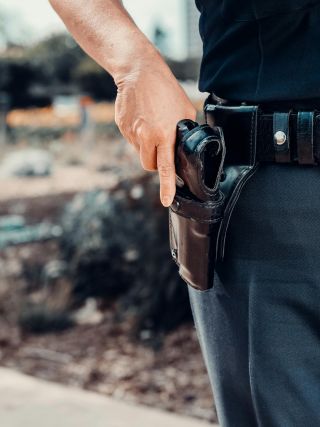Law and Crime
The Falsification of Police Murders as Suicides Is Troubling
Police perjury about suicide can subject survivors to intense traumatic grief.
Updated July 29, 2024 Reviewed by Gary Drevitch
Key points
- A third of Americans believe police “routinely lie to serve their own interests.”
- Judicial favoritism may foster an "above-the-law" attitude that desensitizes police to risks and consequences.
- Stigma, scapegoating, and ostracization are just a few stressors that compound grief for survivors of suicide.

The family of Sonya Massey—whom Deputy Sean Grayson shot in the face as she stood in her kitchen, unarmed and praying for protection—recently publicized that the Sangamon County (Illinois) Sheriff's Office initially told relatives that Sonya had killed herself.
Once body-cam footage disproved Grayson's self-serving account, he was arrested and charged.
The sheriff's department’s deceit evoked memories of when Sandra Bland’s cause of death was ruled “suicide by asphyxiation” (i.e., hanging), in 2015. Public skepticism circulated against a backdrop of nationwide protests for slain victims Freddie Gray, Tamir Rice, and Walter Scott.
For two crucial reasons, suicidologists and suicide awareness advocates should lend expertise from their professional and personal experiences whenever deaths from police brutality are ruled suicides. One reason concerns the possibility of police perjury, or “testilying"; the other is traumatic grief.
Police Perjury Is Systemic
One-third of Americans believe police “routinely lie to serve their own interests,” according to a national poll conducted by Reuters and Ipsos.
Such widespread sentiment suggests that police perjury is a type of misconduct that emerges not from just a few “bad apples" but from the systematic negligence of judges and juries, which often fail to hold corrupt police accountable for misconduct.
Acquittals of cops, for instance, have been the most common verdicts of many trials about police brutality—to the point that, for many, the judicial system’s favoritism toward police has become seen as predictable.
This apparent judicial favoritism may convince police officers that they are above the law, and this self-perception could give way to an authoritarian attitude that leads to abuses of power and schemes to victim-blame targets who have been profiled, provoked, or searched illegally.
Peter Keane, a former San Francisco Police commissioner, admitted in an op-ed for The San Francisco Chronicle that police culture normalized lying, stating:
“Police perjury in court to justify illegal dope searches is commonplace. One of the dirty little not-so-secret secrets of the justice system is undercover narcotics officers intentionally lying under oath. It’s a perversion of the American justice system that strikes directly at the rule of law. Yet it is the routine way of doing business in courtrooms everywhere in America."
.jpg?itok=gOto1pQO)
Justice Gustin Reichbach of the State Supreme Court in Brooklyn, New York, echoed Keane. While reading aloud a guilty verdict for a detective who planted cocaine on a suspect, he attested, “I thought I wasn’t naïve. But even this court was shocked, not only by the seeming pervasive scope of misconduct, but even more distressingly by the seeming casualness by which such conduct is employed.”
Incentives and penalties could be other explanations for why a third of Americans perceive police as dishonest. Some regions base promotions on the proportion of arrests that lead to conviction. Other regions penalize officers for not meeting arrest quotas. Both policies encourage lying. Adil Polanco revealed in an interview with ABC7-NY that arrest quotas encourage lying among his police colleagues, stating plainly, “Our primary job is not to help anybody, our primary job is not to assist anybody, our primary job is to get those numbers and come back with them.”
He continued: “At the end of the night, you have to come back with something. You have to write [up] somebody, you have to arrest somebody—even if the crime is not committed, the number’s there. So our choice is to come up with the number.”
Contesting the institutional dishonesty of law enforcement officers is stressful enough when attempting to debunk allegations for minor crimes or mere infractions.
Now, imagine connecting the dots and figuring out the very slim likelihood of your relative Sonya Massey killing herself in front of police, yet realizing you have no control over the narrative.

‘Testilying’ About Suicide Harms Survivors
On the other hand, imagine you actually believed the lie that your child or sister Sonya Massey killed herself during an incident of police brutality, and the thought of it sent you spiraling.
Jean Mellano, a survivor of suicide, posits that coping through such a taboo tragedy is a tie that binds suicide survivors.
“I’ve observed that there are some common ties that bind suicide survivors,” she wrote. “Yes, some are shared by anyone who grieves the loss of a loved one and I’m by no means trivializing their pain. We all grieve differently and in different ways for different relationships. However, in the case of suicide survivors, I believe our grief is intensified due to the stigmas associated with suicide and society’s inability to comprehend how someone can take their own life.”
She also wrote that when friends back away because they feel ill-equipped to offer ongoing support, suicide survivors carry the weight of guilt alone. They may ruminate over questions like, “Why did [they] give up hope? What could I have done differently to prevent this tragedy? Why didn’t I see the signs? How could [they] do this if [they] loved me?”
To make matters worse, close friends and relatives can sometimes scapegoat one another in an attempt to make sense of the incomprehensible. Just when mutual support and solidarity is needed most, people “make sense” of what they can’t understand by blaming or taking sides.
And if that weren’t enough, suicide survivors can feel like the only ones remembering their loved one for the unforgettable people they were, not just their stigmatized cause of death.
Police perjury is wrong, in and of itself, but to pass off a police murder as suicide and essentially subject a family to one of the most traumatic forms of grief there is, should feel unconscionable.
If you or someone you love is contemplating suicide, seek help immediately. For help 24/7, dial 988 for the National Suicide Prevention Lifeline, or reach out to the Crisis Text Line by texting TALK to 741741. To find a therapist near you, visit the Psychology Today Therapy Directory.




